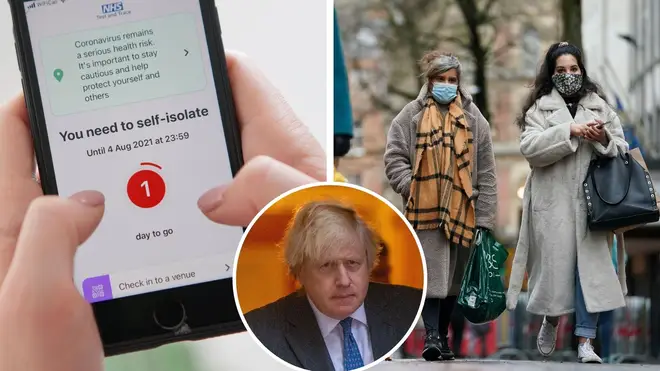
Nick Abbot 10pm - 1am
29 December 2021, 09:12 | Updated: 29 December 2021, 09:44

Ministers should consider slashing the amount of time people infected with Covid have to self-isolate for so they can get back to work, experts have said.
Staff shortages have hit the NHS, public transport and culture spots in recent weeks, as the fast-spreading Omicron variant circulated.
There have been fears that a worst-case scenario could see 40% of London's NHS workforce miss work, largely driven by coronavirus.
The quarantine period has already been reduced to seven days provided tests come back negative in the tail end of that week.
Read more: New Covid case record set as govt says people should still enjoy NYE – 'but cautiously'
Read more: Hundreds wrongly told their Covid test was negative in Australia lab error
But in recent days, trains, museums, theatres and hospitals have been hit by absent staff.
NHS leaders said the greatest pressure they are seeing is from employees being away because of Covid-related issues. Thousands in the health service were off last week.

Jon Ashworth on cutting isolation period
Scientists and business leaders have now suggested the Government reconsider isolation requirements again, with the US having recently reduced the period to just five days.
That view has been bolstered by studies suggesting Omicron is milder than past variants of Covid.
Paul Hunter, professor in medicine at the University of East Anglia, said people who catch Covid would at some point have to get on with their lives "as they would do with any other cold" but "maybe not quite just yet".
Professor Sir John Bell, regius professor of medicine at Oxford University, said: "The health minister has taken advice and looked at the data.
"I think his judgment where we should go in the next few days is probably fine.”
He told the BBC Radio 4 Today programme that people in England had been responsible as Omicron spread and added: "The horrific scenes that we saw a year ago - intensive care units being full, lots of people dying prematurely - that is now history in my view and I think we should reassured that that's likely to continue."
Lord Bilimoria, the president of the Confederation of British Industry, told the BBC that South Africa, where Omicron was first discovered, had stopped requiring asymptomatic people to self-isolate.
"We have got to do everything we can to stop the disruption to our lives and to our livelihoods and to the economy in as safe a way as possible," he said.
"We need people to isolate for as little time as possible."
However, Chloe Smith, the minister for disabled people, health and work, told the BBC there are no plans to reduce the self-isolation time further in England.
Shadow work and pensions secretary Jonathan Ashworth told LBC he wanted to see expert advice on the issue.